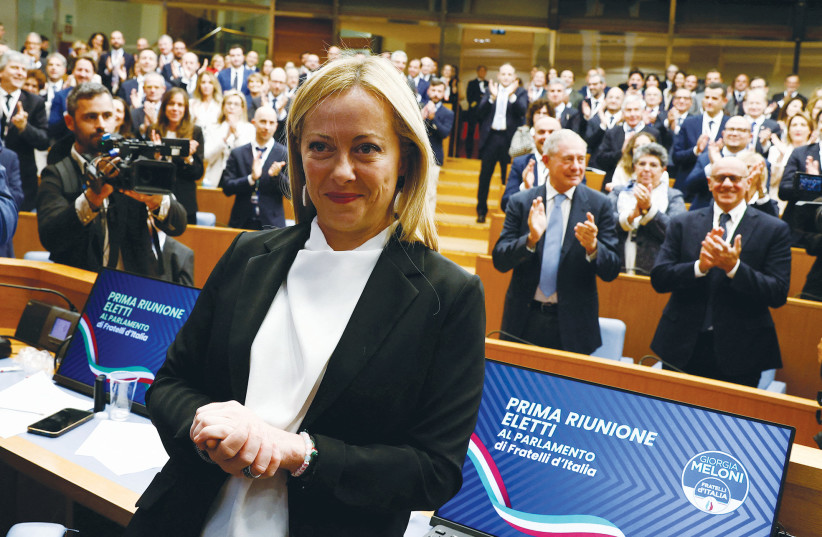Prime Minister Benjamin Netanyahu hopes to sway Italy to recognize Jerusalem as Israel’s capital as he headed to Rome on Thursday for a three-day visit.
"I believe the time has come for Rome to recognize Jerusalem as the ancestral capital of the Jewish people for three thousand years, as the United States did with a gesture of great friendship," Netanyahu said in an interview with Italy's la Repubblica newspaper published on Thursday.
Like the rest of the European Union, Italy has opposed recognition of Jerusalem as Israel’s capital outside of the final status agreement for a two-state resolution to the Israeli/Palestinian conflict. In the interim, the EU has supported a two-state solution based on the pre-1967 lines, with east Jerusalem as the capital of a Palestinian state.
Netanyahu is hoping that Italian Prime Minister Giorgia Meloni, who took office last year and is known as a strong supporter of Israel, will defy EU policy and take a step in support of Jerusalem.
Italian Deputy Prime Minister Matteo Salvini, who leads the rightist Northern League Party, immediately backed Netanyahu’s call. “I firmly say yes to Jerusalem capital of Israel, in the name of peace, history and truth,” he posted on Twitter.
In an interview with Reuters in August last year, before she became prime minister, Meloni was more cautious, saying she had no plans to follow the US, which transferred its embassy to Jerusalem.

“It is a diplomatic matter and should be evaluated together with the Foreign Ministry,” Meloni said.
Aspirations for Italy to recognize Jerusalem as the eternal capital of Israel
In his interview with la Repubblica, Netanyahu blamed the absence of a peace process for the last eight years on the Palestinians – even though he leads a government that is opposed to a two-state resolution to the conflict.
When asked by the paper if he would be willing to negotiate with Palestinian Authority President Mahmoud Abbas, the prime minister said, “Yes, of course – it’s them [the Palestinians] who do not want to negotiate.”
Netanyahu argued that peace with the Palestinians would happen only after Israel normalized its ties with the Arab world, as he touted the possibility of such a deal with Saudi Arabia.
While in Rome, Netanyahu plans to meet with members of the Jewish and business community, and to hold a 45-minute meeting with Meloni on Friday in what is his second foreign trip since taking office. The first was to France last month.
During his conversation with Meloni, he is likely to bring up Italy’s poor record of support at the United Nations.
“Since 2015, Italy has voted against us 89 times at the UN. [This] clashes with our excellent bilateral relations,” Netanyahu told la Repubblica. “Instead of dealing with nations like Syria and Iran, where the most basic rights are trampled on, at the UN, countries vote against Israel, the only democracy in the Middle East. Finally, I would like a closer partnership with Italy on EU policies.”
Netanyahu will also seek to boost economic ties with Italy and raise the prospect of supplying it with natural gas.
"I would like to see more economic cooperation between Israel and Italy."
Prime Minister Benjamin Netanyahu
“I would like to see more economic cooperation [between Israel and Italy]... I believe a closer relationship with your companies will be positive for both sides,” Netanyahu told the Italian daily paper.
“And then there is natural gas: We have a lot of it and I would like to discuss how to get it to Italy to support your economic growth,” he said.
Italy is committed to replacing its imports of energy from Russia in the wake of Moscow’s invasion of Ukraine a year ago.
Last June, Israel and Egypt signed a deal with the European Union aimed at boosting natural gas exports to Europe.
In November, Israel also signed an initial agreement with TotalEnergies and Eni that allows the energy companies to start exploring for natural gas within the framework of a landmark maritime border deal with Lebanon.
On Thursday, in an unusual move, Netanyahu helicoptered to Ben-Gurion International Airport to avoid traffic snarls caused by protesters, after it had initially seemed that he might not go at all when pilots angered by the judicial overhaul plan initially refused to fly him to Rome.
